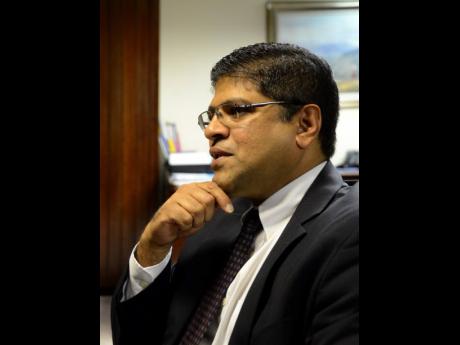Payout for Portland as business signs improve
Private equity fund Portland JSX Limited is dragging a US$1.5-million loss, due to write-downs in the value of its investments, but sees signs of a turnaround in its latest numbers to November.
This month, it’s also due to collect income of US$977,000, less expenses, from Portland Caribbean Fund II, of which it is a limited partner, reflecting its share of a distribution of US$6.19 million received by Fund II.
“This distribution is a good example of the behaviour of private equity, whereby the timing of distributions is uncertain,” said Portland Managing Partner Robert Almeida.
“The underlying investment was made over five years ago and we would have anticipated annual distributions over the last three or so years. For a variety of reasons, the distributions were delayed and this distribution is effectively a catchup. We look forward to further annual distributions and/or a realisation of the investment over the next couple of years,” he told the Financial Gleaner on Thursday.
The fund’s third-quarter performance was positive, with a profit of nearly US$190,000, but too little to erase the fallout in the periods before that when the markets and businesses were on a learning curve, regarding coping with and surviving the pandemic.
Portland JSX is invested in Jamaican and regional businesses, in alliance with related fund Portland Caribbean Fund II, both controlled by investor Michael Lee-Chin and partners. Portland JSX, which wrapped up its investment phase early last year, has been in operation since 2015. Its full cycle ends in 2024, with the possibility of two additional, consecutive one-year terms.
The pandemic has thrown out the fund’s initial projections on the returns it expected to reap within a specific period by around two years.
Almeida sees the fund’s third-quarter performance as an indicator that business was turning the corner for its investees.
“The increase in value in the most recent quarter would suggest that the net of these effects was positive, which is encouraging. It should also be noted that the nine-month decline in fair value is less than 5 per cent of the overall portfolio value, a positive reflection of the diversification of the portfolio as well as the resiliency of the companies within the portfolio,” he said.
Portland JSX’s investor base features a cross section of development finance institutions, pension plans, and insurance businesses, according to the company.
The fund is fully invested – having poured just about US$15 million into deals over five years – and says it is focused on making growth equity investments in high-quality, scalable businesses, as well as transactions in the infrastructure and essential asset sector. The fund’s geographical mandate covers the Caribbean Basin – a region that includes the Caribbean, Colombia, and Central America. Portfolio companies include interEnergy Holdings, Clarien Group, Productive Business Solutions, itelBPO, Chukka Caribbean, among others.
As expected early in the pandemic, said Almeida, there was substantial uncertainty as to the impact the mitigation measures instituted to stem the spread of the virus would have on portfolio company valuations.
“With the passage of time, two things happen. The first is that the pandemic and associated impact progresses. The second is that the companies in the portfolio take actions to mitigate adverse impact and seize opportunities,” he explained.
Fair value losses on Portland’s investments amounted to US$1.15 million over nine months ending November 2020, descending from the US$1.94 million of gains in the comparative 2019 period.
For the three-month period ending November, the gains were positive at US$356,000, but lower than the US$548,000 recorded in the third quarter of 2019.
At the company’s annual general meeting last year, Almeida alerted shareholders to the possibility of having to wait longer to reap the expected returns. And he is still holding to that line.
“Looking at the portfolio in aggregate, we believe that the pandemic has delayed the timing, but not the amount of expected cash inflows; and we estimate the delay to be about one to two years,” he said.

